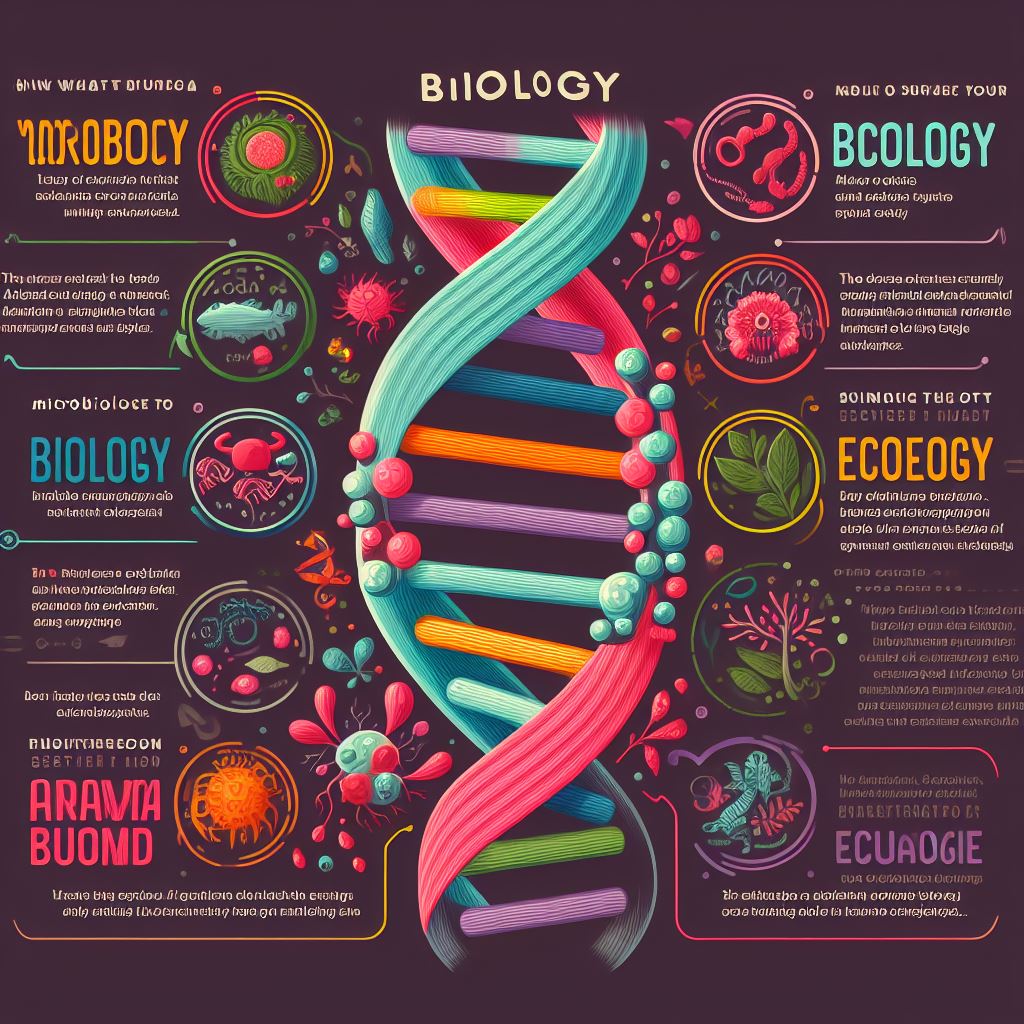Biology is a captivating and multifaceted scientific discipline that explores the intricacies of life and living organisms. In this comprehensive article, we will delve deep into the definition of biology, its profound significance, the various branches that make up this diverse field, the importance of biology in our everyday lives, and the wide-ranging subjects that biology encompasses.
- Biology Definition
- The Study of Life
- Branches of Biology
- Importance of Biology
- What Does Biology Study?
- The Key Concepts in Biology: From Cells to Ecosystems
- Cell Biology
- Molecular Biology
- Genetics
- Evolution
- Ecology
- Anatomy:
- Physiology
- The Role of Biology in Advancing Medical Science and Healthcare
- Medical Biology: Understanding the Foundation of Health and Disease
- Healthcare Advancements through Biology Research
- Biotechnology in Medicine: A Revolution in Healthcare
- The Future of Healthcare: Integrating Biology and Technology
- Biology and its Impact on the Environment and Conservation Efforts
- Environmental Biology: Understanding Ecosystems and Ecological Processes
- Conservation Biology: Preserving Biodiversity and Ecosystems
- Biodiversity Preservation: The Essence of Life on Earth
- Human Impact on Biodiversity and the Environment
- Biology's Role in Mitigating Environmental Challenges
- The Future of Conservation and Biodiversity Preservation
Biology Definition
At its essence, biology is the scientific study of life. It encompasses the examination and exploration of living organisms, their structure, functions, growth, evolution, and the myriad processes that govern their existence. This field of science seeks to unravel the mysteries of life itself, from the smallest cells to the grandeur of ecosystems, offering profound insights into the natural world.
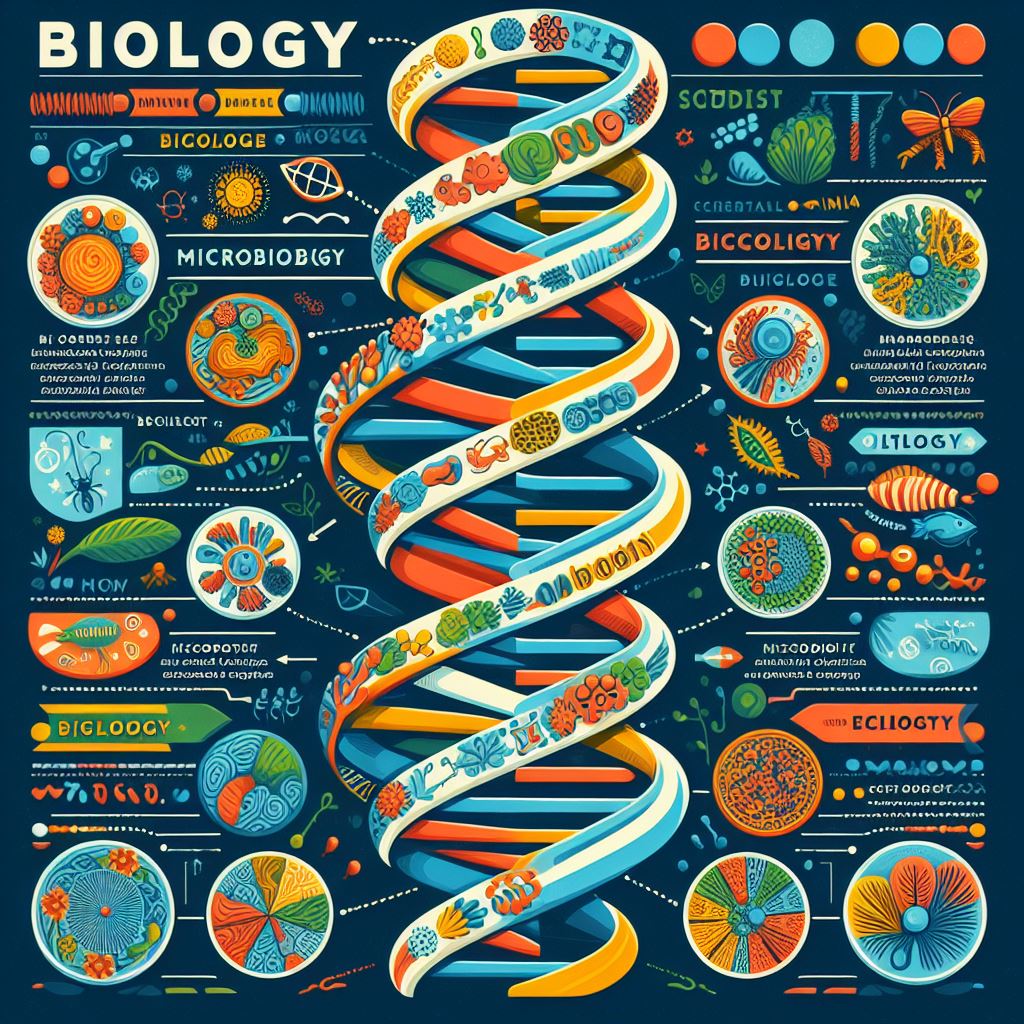
The Study of Life
Biology delves into the fundamental processes that define and sustain life. It is an exploration of the mechanisms that allow organisms to grow, reproduce, respond to their environment, and adapt to changing conditions. From the birth of a single cell to the intricate interactions within an ecosystem, biology seeks to understand and explain the essence of existence.
Branches of Biology
Biology is an extensive and diversified field, and it can be subdivided into numerous specialized branches, each with its own focus and area of study. Here are some of the primary branches of biology:
- Botany: This branch concentrates on the study of plants, encompassing their structure, growth, reproduction, and ecological roles. Botanists explore the incredible diversity of plant life, from towering trees to tiny mosses.
- Zoology: Zoology is dedicated to the examination of animals. It includes the investigation of animal anatomy, behavior, evolution, classification, and interactions within their ecosystems. Zoologists explore the remarkable diversity of the animal kingdom, from microscopic organisms to large mammals.
- Microbiology: Microbiology deals with the world of microscopic organisms, such as bacteria, viruses, fungi, and protists. Microbiologists study these tiny life forms and their roles in health, disease, industry, and ecosystems.
- Genetics: Genetics explores the inheritance of traits in organisms and the molecular mechanisms governing genetic information. This branch is essential in understanding how traits are passed from one generation to the next and how genetic variations arise.
- Ecology: Ecology focuses on the relationships between organisms and their environments. It examines topics like ecosystems, population dynamics, conservation, and the intricate web of interactions that drive life on Earth.
- Physiology: Physiology investigates the functions and processes that occur within living organisms. From the beating of the heart to the digestion of food, this branch seeks to comprehend the inner workings of life.
- Evolutionary Biology: Evolutionary biology delves into the processes of evolution and the mechanisms by which species change over time. It explores concepts like natural selection, adaptation, and the origin of species.
- Biochemistry: Biochemistry explores the chemical processes and molecules that underlie biological functions. This branch investigates the molecular basis of life, including DNA, proteins, and metabolic pathways.
Importance of Biology
Biology holds immense importance in our lives and in the broader context of science and society. Here are some key reasons why biology matters:
- Understanding Life: Biology helps us understand the nature of life itself, from the simplest microbes to the most complex ecosystems. It provides insights into what it means to be alive and the processes that sustain life.
- Advancements in Medicine: Biology plays a crucial role in medical research and healthcare. It enables the discovery of new treatments, the understanding of diseases, and the development of vaccines and therapies that improve human health and well-being.
- Sustainable Agriculture: Biology contributes to sustainable agriculture by studying crop genetics, pest management, and soil health. This knowledge is vital for ensuring a stable and sufficient food supply for a growing global population.
- Conservation of Biodiversity: Biology informs conservation efforts to protect endangered species and preserve biodiversity. It helps us understand the interconnectedness of species and ecosystems and the importance of maintaining ecological balance.
- Environmental Stewardship: Biology provides insights into the impact of human activities on the environment. It informs efforts to mitigate the effects of climate change, pollution, habitat destruction, and other environmental challenges.
- Biotechnology: Biology drives advancements in biotechnology, enabling innovations like genetic engineering, gene therapy, and the production of pharmaceuticals, enzymes, and biofuels.
- Understanding Ourselves: Biology sheds light on our own species, Homo sapiens, including our evolutionary history, genetics, and behavior. It helps us understand our place in the natural world and our responsibility as stewards of the planet.
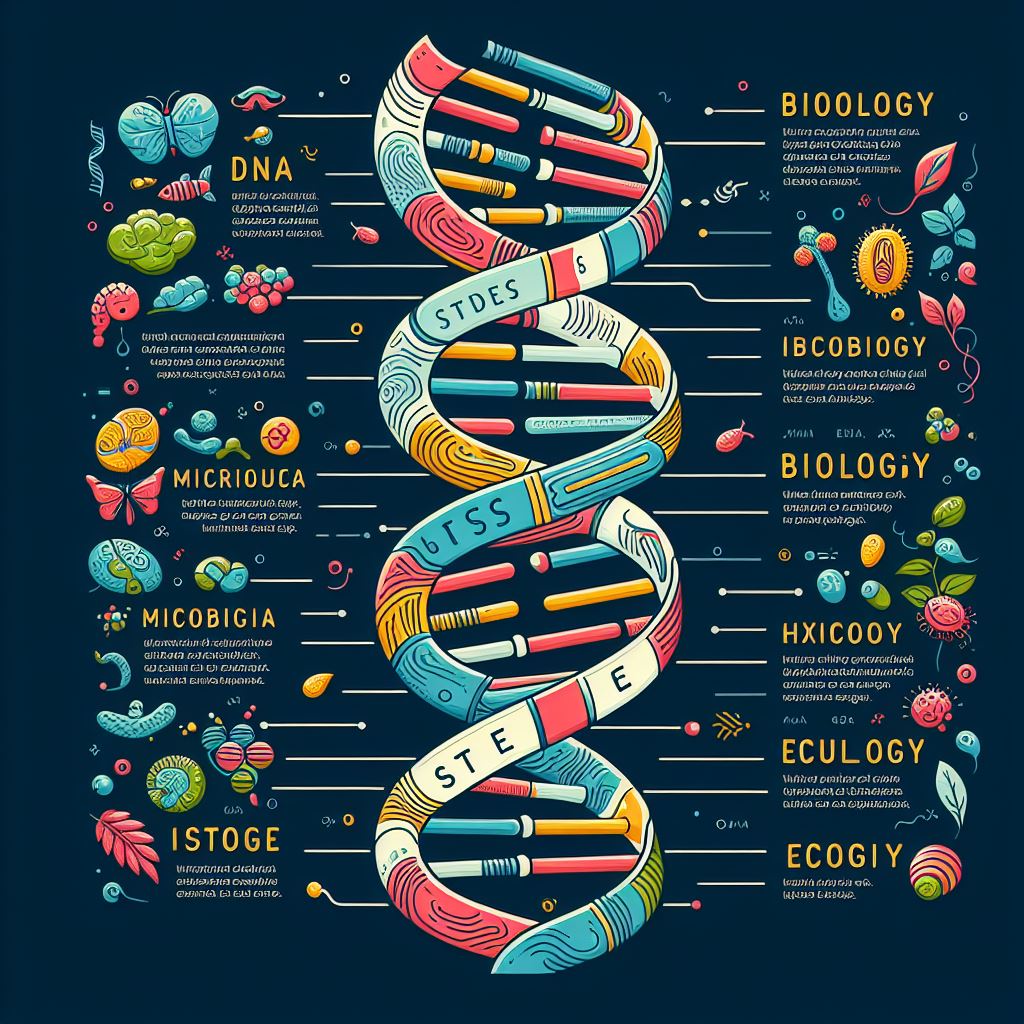
What Does Biology Study?
Biology is a comprehensive field that studies life in all its forms, from the tiniest molecules to the largest ecosystems. Here are some of the fundamental areas that biology explores:
- Cellular Biology: Investigates the structure and function of cells, the basic units of life.
- Molecular Biology: Explores the molecular mechanisms that control life processes, including DNA, RNA, and protein synthesis.
- Anatomy: Examines the structure of organisms, from organ systems down to individual tissues and organs.
- Behavioral Biology: Studies the behavior of organisms, including animal behavior, ethology, and behavioral ecology.
- Taxonomy: Involves the classification and categorization of living organisms into hierarchical groups.
- Biogeography: Explores the distribution of species across geographical regions and the factors influencing their distribution.
- Paleontology: Investigates the history of life on Earth through the study of fossils and ancient organisms.
- Immunology: Examines the immune system and how organisms defend themselves against pathogens.
- Neurobiology: Focuses on the structure and function of the nervous system and the study of the brain.
- Environmental Biology: Addresses the interactions between living organisms and their environments, including topics like ecology, conservation, and environmental science.
- Developmental Biology: Explores how organisms grow and develop from a single fertilized egg into a complex, multicellular organism.
- Evolutionary Developmental Biology (Evo-Devo): Investigates the role of genes in shaping the development and evolution of organisms.
In essence, biology is the pursuit of knowledge about life, and it encompasses a vast array of topics and sub-disciplines that collectively help us unravel the intricacies of the living world.
In conclusion, biology is a cornerstone of scientific understanding and an integral part of our daily lives. It not only enriches our knowledge of the natural world but also offers practical solutions to some of the most pressing challenges facing humanity. Whether you are curious about the diversity of life, the inner workings of cells, or the conservation of our planet, biology provides a fascinating journey into the heart of existence.
Physiology explores the functions and processes that occur within living organisms. It focuses on how organs and systems work together to maintain life. Key concepts in physiology include:
- Homeostasis: The regulation of internal conditions to maintain a stable and balanced environment.
- Respiration: The process of breathing and how organisms obtain oxygen and release carbon dioxide.
- Circulation: The movement of blood and nutrients throughout the body.
- Neurophysiology: The study of the nervous system and how it controls bodily functions.
Understanding these key concepts in biology is essential for gaining insight into the complexity and beauty of life. They form the foundation of biological knowledge and provide a framework for further exploration and discovery in the field of biology. From the smallest cellular processes to the vast ecosystems that encompass our planet, these concepts help us make sense of the living world and our place within it.
2
- DNA Structure: Understanding the double-helix structure of DNA and its role as the genetic code.
- DNA Replication: The process by which DNA is copied during cell division.
- Gene Expression: How genes are transcribed into RNA and translated into proteins.
- Genetic Regulation: The mechanisms that control gene activity, including gene regulation and epigenetics.
3. Genetics:
Genetics is the study of inheritance and the variation of traits in organisms. It explores how genes are passed from one generation to the next and how genetic information is transmitted. Key concepts in genetics include:
- Mendelian Genetics: The principles of inheritance discovered by Gregor Mendel, including dominant and recessive traits.
- Genetic Variation: Understanding genetic diversity within populations and how it contributes to evolution.
- Genetic Disorders: The study of genetic mutations and their implications for health.
- Genetic Engineering: The manipulation of genes for practical purposes, such as biotechnology and gene therapy.
4. Evolution:
Evolutionary biology seeks to explain the diversity of life on Earth and how species have changed over time. It is based on the foundational concept of natural selection proposed by Charles Darwin. Key concepts in evolution include:
- Natural Selection: The process by which organisms with advantageous traits are more likely to survive and reproduce, leading to the gradual evolution of species.
- Common Descent: The idea that all living organisms share a common ancestor.
- Adaptation: How species evolve traits that are suited to their environments.
- Speciation: The formation of new species through reproductive isolation.
5. Ecology:
Ecology is the study of how organisms interact with each other and their environment. It examines the relationships between living organisms and their surroundings, from individual species to entire ecosystems. Key concepts in ecology include:
- Ecosystems: The complex interactions between living organisms and their physical and biological environments.
- Food Chains and Food Webs: The flow of energy and nutrients through ecosystems.
- Biodiversity: The variety of species in an ecosystem and its importance for ecosystem stability.
- Conservation Biology: Strategies for preserving and protecting natural habitats and species.
6. Anatomy:
Anatomy is the study of the structure of organisms. It involves the examination of tissues, organs, and organ systems to understand their form and function. Key concepts in anatomy include:
- Human Anatomy: The study of the structure of the human body, including organs and systems like the circulatory, nervous, and skeletal systems.
- Comparative Anatomy: Comparing the anatomical structures of different species to understand evolutionary relationships.
- Microscopic Anatomy: Exploring tissues and cells using microscopes.
7. Physiology:
Physiology explores the functions and processes that occur within living organisms. It focuses on how organs and systems work together to maintain life. Key concepts in physiology include:
- Homeostasis: The regulation of internal conditions to maintain a stable and balanced environment.
- Respiration: The process of breathing and how organisms obtain oxygen and release carbo
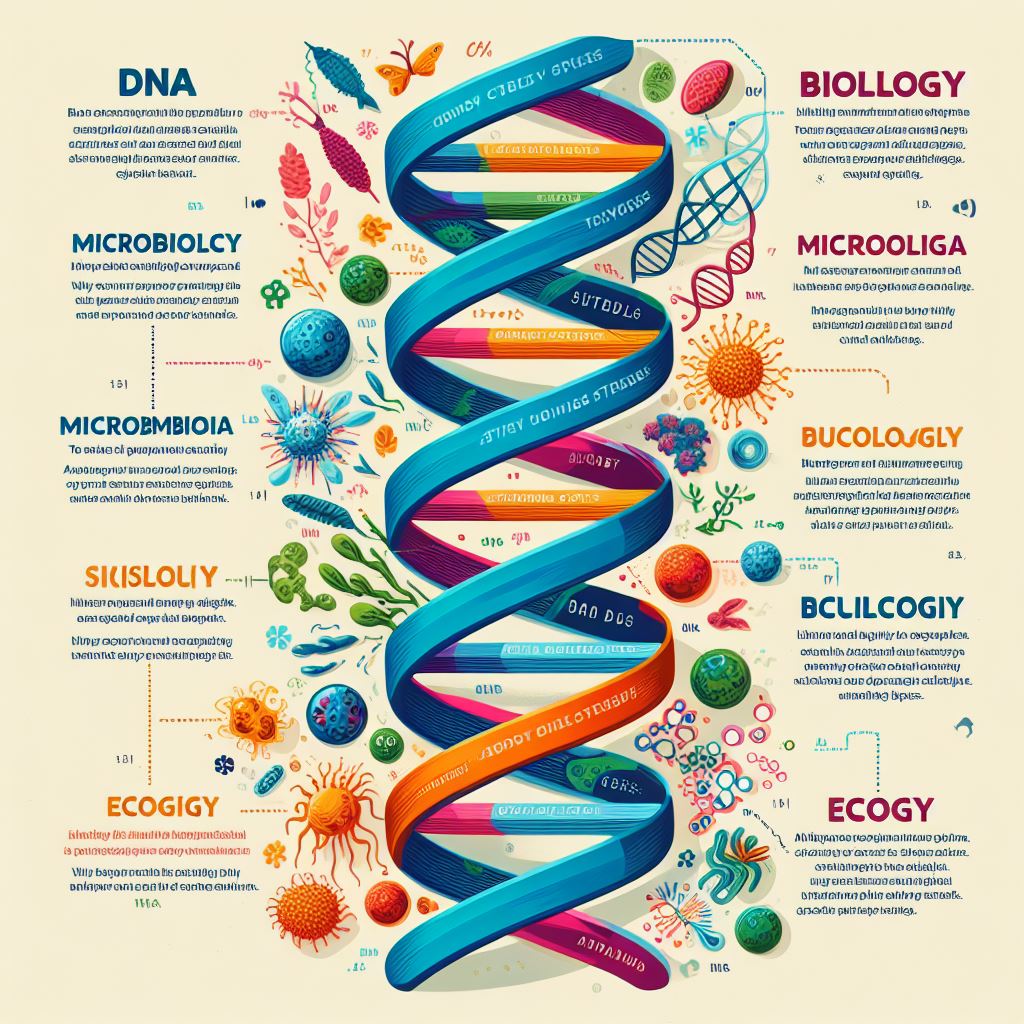
The Key Concepts in Biology: From Cells to Ecosystems
Biology is a vast and intricate field of science that encompasses a wide range of topics and concepts. From the microscopic world of cells to the grand scale of ecosystems, biology seeks to unravel the mysteries of life on Earth. In this comprehensive article, we will explore the key concepts in biology, including cell biology, molecular biology, genetics, evolution, ecology, anatomy, and physiology. These concepts are fundamental to understanding the living world and are at the core of biological research and knowledge.
Cell Biology
Cell biology, also known as cytology, is the study of cells—the basic structural and functional units of life. Cells are the building blocks of all living organisms, and cell biology delves into their structure, function, and interactions. Key concepts in cell biology include:
- Cell Structure: The study of cell components, including the cell membrane, nucleus, cytoplasm, and organelles such as mitochondria and the endoplasmic reticulum.
- Cell Function: Investigating the various processes that occur within cells, such as metabolism, energy production, and cell division.
- Cell Types: Understanding the different types of cells, such as prokaryotic cells (e.g., bacteria) and eukaryotic cells (e.g., plant and animal cells).
Molecular Biology
Molecular biology explores the molecular mechanisms that underlie biological processes. It focuses on the study of DNA, RNA, proteins, and other macromolecules critical to life. Key concepts in molecular biology include:
- DNA Structure: Understanding the double-helix structure of DNA and its role as the genetic code.
- DNA Replication: The process by which DNA is copied during cell division.
- Gene Expression: How genes are transcribed into RNA and translated into proteins.
- Genetic Regulation: The mechanisms that control gene activity, including gene regulation and epigenetics.
Genetics
Genetics is the study of inheritance and the variation of traits in organisms. It explores how genes are passed from one generation to the next and how genetic information is transmitted. Key concepts in genetics include:
- Mendelian Genetics: The principles of inheritance discovered by Gregor Mendel, including dominant and recessive traits.
- Genetic Variation: Understanding genetic diversity within populations and how it contributes to evolution.
- Genetic Disorders: The study of genetic mutations and their implications for health.
- Genetic Engineering: The manipulation of genes for practical purposes, such as biotechnology and gene therapy.
Evolution
Evolutionary biology seeks to explain the diversity of life on Earth and how species have changed over time. It is based on the foundational concept of natural selection proposed by Charles Darwin. Key concepts in evolution include:
- Natural Selection: The process by which organisms with advantageous traits are more likely to survive and reproduce, leading to the gradual evolution of species.
- Common Descent: The idea that all living organisms share a common ancestor.
- Adaptation: How species evolve traits that are suited to their environments.
- Speciation: The formation of new species through reproductive isolation.
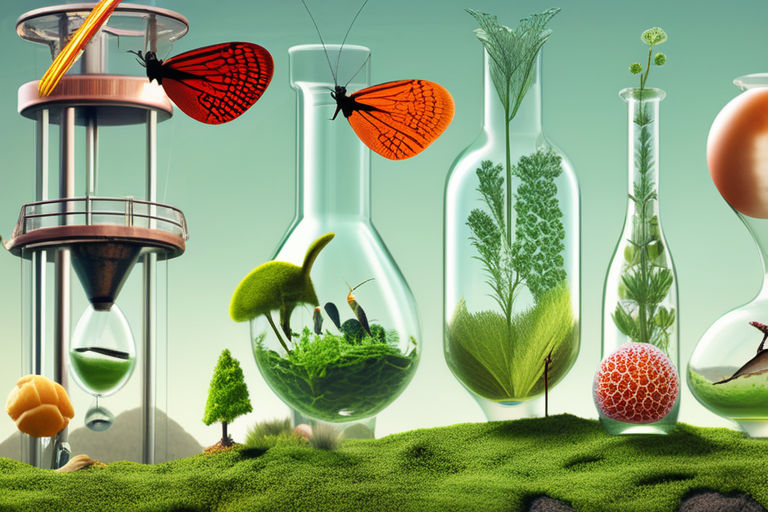
Ecology
Ecology is the study of how organisms interact with each other and their environment. It examines the relationships between living organisms and their surroundings, from individual species to entire ecosystems. Key concepts in ecology include:
- Ecosystems: The complex interactions between living organisms and their physical and biological environments.
- Food Chains and Food Webs: The flow of energy and nutrients through ecosystems.
- Biodiversity: The variety of species in an ecosystem and its importance for ecosystem stability.
- Conservation Biology: Strategies for preserving and protecting natural habitats and species.
Anatomy:
Anatomy is the study of the structure of organisms. It involves the examination of tissues, organs, and organ systems to understand their form and function. Key concepts in anatomy include:
- Human Anatomy: The study of the structure of the human body, including organs and systems like the circulatory, nervous, and skeletal systems.
- Comparative Anatomy: Comparing the anatomical structures of different species to understand evolutionary relationships.
- Microscopic Anatomy: Exploring tissues and cells using microscopes.
Physiology
Physiology explores the functions and processes that occur within living organisms. It focuses on how organs and systems work together to maintain life. Key concepts in physiology include:
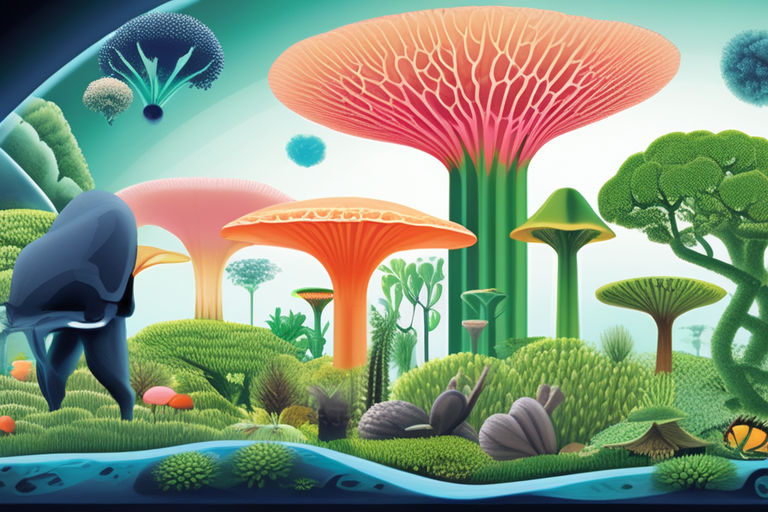
- Homeostasis: The regulation of internal conditions to maintain a stable and balanced environment.
- Respiration: The process of breathing and how organisms obtain oxygen and release carbon dioxide.
- Circulation: The movement of blood and nutrients throughout the body.
- Neurophysiology: The study of the nervous system and how it controls bodily functions.
Understanding these key concepts in biology is essential for gaining insight into the complexity and beauty of life. They form the foundation of biological knowledge and provide a framework for further exploration and discovery in the field of biology. From the smallest cellular processes to the vast ecosystems that encompass our planet, these concepts help us make sense of the living world and our place within it. fundamental to understanding the living world and are at the core of biological research and knowledge.
The Role of Biology in Advancing Medical Science and Healthcare
Biology, the study of life and living organisms, plays a pivotal role in driving advancements in medical science and healthcare. From understanding the fundamental principles of human biology to harnessing the power of biotechnology, biology is at the forefront of efforts to improve our understanding of health and disease, develop innovative treatments, and enhance the overall quality of healthcare. In this comprehensive article, we will explore the role of biology in advancing medical science, the remarkable healthcare advancements achieved through biological research, and the transformative impact of biotechnology in medicine.
Medical Biology: Understanding the Foundation of Health and Disease
Medical biology, also known as biomedical science, forms the bedrock of modern medicine. It involves the application of biological principles and techniques to gain insights into health, disease, and the human body’s intricacies. Key aspects of medical biology include:
- Understanding Health: Biology provides the fundamental knowledge of human anatomy, physiology, and genetics. This understanding is crucial for identifying normal bodily functions and deviations that may indicate disease.
- Disease Diagnosis: Biology plays a central role in diagnosing illnesses. Techniques such as molecular biology and medical imaging allow healthcare professionals to detect and characterize diseases accurately.
- Drug Discovery: Biology informs the development of pharmaceuticals by elucidating the mechanisms of diseases at the molecular level. This knowledge is essential for designing drugs that target specific pathways involved in disease progression.
- Genomic Medicine: Advances in genetics and genomics have revolutionized medicine. Genetic testing can identify predispositions to certain diseases, guide treatment decisions, and even predict responses to medications.
Healthcare Advancements through Biology Research
Biology research has led to numerous breakthroughs that have transformed healthcare in profound ways. Some notable advancements include:
- Vaccines: Biology has played a critical role in the development of vaccines, which have eradicated or significantly reduced the impact of numerous deadly diseases, such as smallpox, polio, and measles.
- Antibiotics: The discovery of antibiotics, driven by understanding bacterial biology, revolutionized medicine by providing effective treatments for bacterial infections.
- Precision Medicine: Advances in genetics and molecular biology have paved the way for personalized medicine. Tailoring treatments to an individual’s genetic makeup can lead to more effective and less harmful therapies.
- Organ Transplants: Biology has enabled organ transplantation by elucidating the body’s immune response and developing immunosuppressive drugs that prevent organ rejection.
- Cancer Treatments: Insights from cellular and molecular biology have led to targeted therapies that specifically target cancer cells, sparing healthy tissue and reducing side effects.
- Stem Cell Research: Biology research on stem cells holds promise for regenerative medicine, offering the potential to repair or replace damaged tissues and organs.
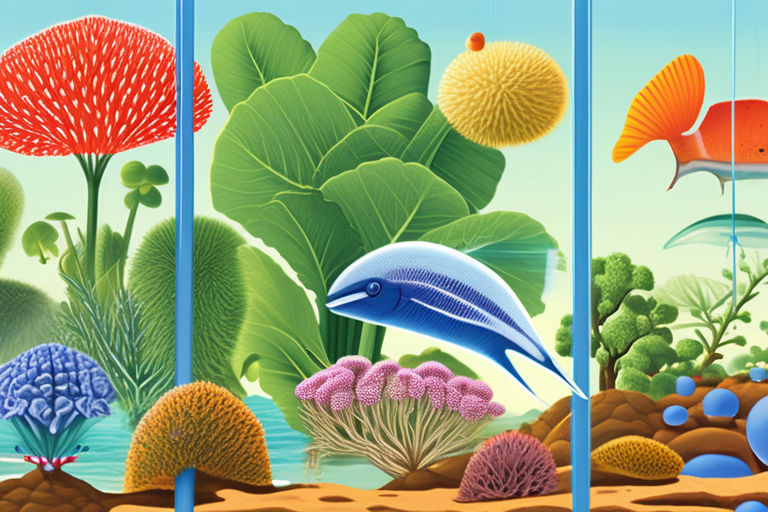
Biotechnology in Medicine: A Revolution in Healthcare
Biotechnology, the fusion of biology and technology, has opened up new frontiers in medicine. It involves the manipulation of biological systems and organisms to develop novel treatments, diagnostics, and therapies. Biotechnology has made a significant impact on healthcare in the following ways:
- Biopharmaceuticals: Biotechnology has enabled the production of biopharmaceuticals, including monoclonal antibodies and recombinant proteins. These drugs are used to treat a wide range of diseases, from cancer to autoimmune disorders.
- Gene Therapy: Biotechnology has led to the development of gene therapy techniques, which involve modifying or replacing faulty genes to treat genetic disorders.
- CRISPR-Cas9: This revolutionary gene-editing technology has the potential to correct genetic mutations that cause diseases, offering hope for conditions like sickle cell anemia and muscular dystrophy.
- Diagnostics: Biotechnology has improved diagnostic tools, making it possible to detect diseases with greater sensitivity and specificity, leading to earlier intervention and better outcomes.
- Regenerative Medicine: Biotechnology research has given rise to tissue engineering and 3D bioprinting, allowing for the creation of artificial organs and tissues for transplantation.
- Pharmacogenomics: Biotechnology contributes to pharmacogenomics, which tailors drug prescriptions to an individual’s genetic makeup, reducing adverse reactions and optimizing treatment outcomes.
- Vaccine Development: Biotechnology accelerates vaccine development, as seen with the rapid development of COVID-19 vaccines, demonstrating the agility of biotech in responding to emerging threats.
The Future of Healthcare: Integrating Biology and Technology
The intersection of biology and technology continues to shape the future of healthcare in exciting ways:
- Artificial Intelligence (AI) in Medicine: AI, fueled by biological data, can analyze vast datasets, predict disease trends, and assist in diagnosis and treatment decisions.
- Telemedicine: Advances in biology and information technology have facilitated remote healthcare consultations, making healthcare more accessible and convenient.
- Biomarker Discovery: Biology research is uncovering new biomarkers that can aid in early disease detection and monitoring treatment responses.
- Nanomedicine: Nano-sized drug delivery systems, informed by biology, are being developed to target specific cells or tissues, improving drug efficacy and reducing side effects.
- Bioinformatics: The integration of biology and computational methods is advancing our ability to analyze biological data, from genomics to proteomics, paving the way for personalized medicine.
- Synthetic Biology: This emerging field allows for the design and construction of biological systems for various applications, including the production of biofuels, pharmaceuticals, and biosensors.
In conclusion, biology serves as the foundation upon which medical science and healthcare advancements are built. From the understanding of the human body’s intricate biology to the application of biotechnology, biology is instrumental in diagnosing, treating, and preventing diseases. The ongoing integration of biology and technology holds the promise of even greater healthcare innovations, offering hope for improved patient outcomes, increased accessibility to healthcare, and a brighter future for global health. As the boundaries of biological knowledge continue to expand, so too will our capacity to transform healthcare and enhance the quality of life for individuals around the world.
Biology and its Impact on the Environment and Conservation Efforts
Biology, the scientific study of life and living organisms, is intricately connected to the environment. It provides critical insights into the natural world, the delicate balance of ecosystems, and the intricate web of life on our planet. In this comprehensive article, we will explore the profound impact of biology on the environment and conservation efforts, focusing on environmental biology, conservation biology, and the preservation of biodiversity.
Environmental Biology: Understanding Ecosystems and Ecological Processes
Environmental biology is a sub-discipline of biology that concentrates on the study of the environment, ecosystems, and the interactions between living organisms and their surroundings. It is central to our understanding of the natural world and the ecological processes that sustain life on Earth. Key aspects of environmental biology include:
- Ecosystem Dynamics: Environmental biology investigates the dynamics of ecosystems, including energy flow, nutrient cycling, and the roles of different species within these complex systems.
- Biotic and Abiotic Factors: It explores the interactions between living organisms (biotic factors) and their non-living environment (abiotic factors), such as temperature, water, and soil composition.
- Ecological Niches: Understanding the ecological niches of species—how they fit into their environments—helps predict their ecological roles and potential impacts on the ecosystem.
- Biodiversity: Environmental biology assesses the diversity of life within ecosystems, from the variety of species to genetic diversity within populations.
- Conservation: It plays a crucial role in informing conservation strategies by identifying endangered species, understanding their habitats, and studying the impact of human activities on ecosystems.
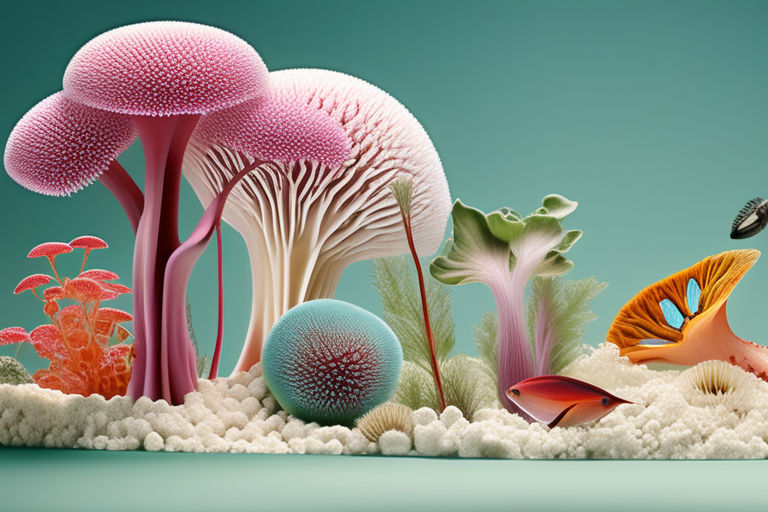
Conservation Biology: Preserving Biodiversity and Ecosystems
Conservation biology is a specialized field of biology dedicated to the protection, preservation, and restoration of biodiversity and the natural environment. It addresses the urgent need to mitigate the loss of species and ecosystems due to various threats, including habitat destruction, climate change, pollution, and overexploitation. Key aspects of conservation biology include:
- Biodiversity Conservation: Conservation biology focuses on preserving the richness of life on Earth by protecting species, populations, and genetic diversity.
- Habitat Conservation: It emphasizes safeguarding and restoring critical habitats, such as forests, wetlands, coral reefs, and grasslands, which are essential for numerous species’ survival.
- Endangered Species: Conservation biologists work to identify and protect endangered species, as well as implement breeding and reintroduction programs to boost their populations.
- Ecosystem Services: Conservation biology recognizes the essential services provided by ecosystems, such as clean air and water, pollination, and carbon sequestration, and seeks to maintain these services for human well-being.
- Human Impact: It examines the impacts of human activities on the environment and strives to find sustainable solutions that balance the needs of people with the conservation of nature.
Biodiversity Preservation: The Essence of Life on Earth
Biodiversity, the variety of life on Earth, is a cornerstone of the natural world. It encompasses the diversity of species, genetic variation within populations, and the variety of ecosystems and habitats. Biodiversity is not only beautiful and awe-inspiring but also essential for the functioning of ecosystems and the well-being of human societies. Here’s why biodiversity preservation is of paramount importance:
- Ecosystem Stability: Biodiverse ecosystems are more stable and resilient, better able to withstand environmental changes, such as disease outbreaks or extreme weather events.
- Food Security: Biodiversity is crucial for food production, providing a variety of crops and livestock that support human diets and livelihoods.
- Medicinal Resources: Many medicines and pharmaceuticals are derived from plants, animals, and microorganisms found in diverse ecosystems.
- Climate Regulation: Biodiverse forests and oceans act as carbon sinks, helping regulate the Earth’s climate by absorbing and storing carbon dioxide.
- Pollination: Biodiversity, particularly pollinators like bees, plays a vital role in pollinating crops and ensuring agricultural productivity.
- Cultural and Aesthetic Value: Biodiversity enriches human culture, offering inspiration, spiritual value, and opportunities for recreation and tourism.
Human Impact on Biodiversity and the Environment
Human activities have had profound and often detrimental effects on the environment and biodiversity. These impacts include:
- Habitat Destruction: Deforestation, urbanization, and agriculture have led to the loss of natural habitats, pushing many species to the brink of extinction.
- Pollution: Pollution from industrial processes, agriculture, and transportation has contaminated air, water, and soil, harming both ecosystems and human health.
- Overexploitation: The overharvesting of natural resources, such as overfishing and poaching, has depleted populations of numerous species.
- Climate Change: Human-induced climate change, driven by the burning of fossil fuels and deforestation, disrupts ecosystems and threatens species adapted to specific temperature ranges.
- Invasive Species: The introduction of non-native species to new environments can disrupt native ecosystems and outcompete or prey on native species.
Biology’s Role in Mitigating Environmental Challenges
Biology is instrumental in addressing these environmental challenges and promoting conservation efforts. Here’s how biology contributes to mitigating environmental issues:
- Scientific Understanding: Biology provides the knowledge and tools to understand ecosystems, species interactions, and the impacts of human activities on the environment.
- Conservation Strategies: Conservation biology informs the development of strategies to protect and restore biodiversity, including habitat restoration and captive breeding programs.
- Sustainable Practices: Biological research guides the development of sustainable agricultural, forestry, and fisheries practices that minimize environmental harm.
- Technological Advancements: Advances in biology and biotechnology facilitate the monitoring of ecosystems, such as through DNA analysis and remote sensing.
- Policy and Advocacy: Biologists play a crucial role in advocating for environmental protection and influencing policy decisions at local, national, and international levels.
The Future of Conservation and Biodiversity Preservation
As we face mounting environmental challenges, the role of biology in conservation and biodiversity preservation has never been more critical. The future of these efforts will rely on interdisciplinary collaboration, innovative technologies, and a shared commitment to sustainable practices. Some key areas of focus for the future include:
- Restoration Ecology: The restoration of damaged ecosystems and habitats to their natural state is a growing field that aims to revitalize biodiversity.
- Conservation Genetics: Advances in genetics enable the identification of genetically distinct populations and guide breeding and reintroduction efforts.
- Global Collaboration: International cooperation is essential for conserving migratory species and addressing global environmental issues, such as climate change.
- Community Engagement: Engaging local communities in conservation efforts and respecting traditional ecological knowledge can enhance conservation outcomes.
- Educational Initiatives: Raising awareness and educating the public about the importance of biodiversity and environmental conservation is crucial for fostering a culture of conservation.
In conclusion, biology’s profound impact on the environment and conservation efforts cannot be overstated. It provides the scientific foundation for understanding the natural world, identifying threats to biodiversity, and developing strategies to protect our planet’s ecosystems and species. The preservation of biodiversity is not only a moral imperative but also essential for the well-being of future generations. Through continued research, education, and concerted global efforts, biology will remain at the forefront of our quest to safeguard the environment and preserve the rich tape


